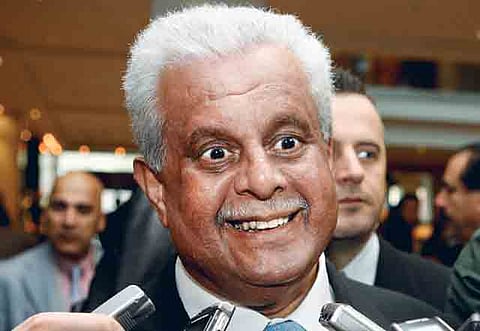Opec needs prices to stay above $70
Qatari minister says group looks to attract investment to boost output capacity

Manama: Oil prices should stay between $70 (Dh257) and $80 a barrel to satisfy both producers and consumers, Qatar's energy minister has said.
"The Organisation of Petroleum Exporting Countries (Opec), producer of almost 40 per cent of the world's daily oil supply, will need crude prices to remain above $70 a barrel to attract the investment required to build the additional production capacity needed to meet future oil demand," Abdullah Bin Hamad Al Attiyah, Qatar's Deputy Prime Minister and Minister of Energy and Industry, said.
"The price of $150 a barrel is not a fair price to consumers," he told a gathering of around 100 executives from the energy industry at the Opec50: Doha Energy Forum.
Al Attiyah rejected calls to link oil pricing with currencies other than the US dollar at present, explaining that they would cause confusion in the global oil market.
"Despite the recent global economic setback, demand for oil and gas will increase remarkably in the years ahead and Opec's member countries will be called upon to meet the lion's share of incremental oil demand in the next 25 years, when global energy use is expected to expand by some 50 per cent," Al Attiyah said, quoted by Qatar News Agency (QNA).
"This will require huge levels of investment to make sure oil is readily available when it is required," Al Attiyah said, quoted by Qatar News Agency (QNA).
The minister stressed the need for cooperation between the oil-producing countries on the one hand and the oil consuming countries on the other to create a balance in the oil demand market and secure the adequate energy supplies at a global level.
Answering a question about the possibility of joint cooperation between Opec countries and the non-Opec or the oil-producers outside Opec, Al Attiyah confirmed Opec's commitment to constant dialogue with non-Opec producers to coordinate views with them on the world oil market, particularly with regard to the output quotas.
However, he urged these states to abide by their respective production quotas to create a balance in the market and maintain agreed production levels.
He said that Opec welcomed the entry of new producers to the organisation.
Biggest consumer
Referring to the recent changes in global oil consumption, the minister said that the United States consumed about 22 million barrels per day, almost a quarter of the world's total consumption.
Al Attiyah, whose country holds the world's third largest gas reserves, also called for a fair treatment for the gas prices, just like the oil prices at the global level, through their standardisation and their protection from fluctuations.
The minister said it was necessary to meet the challenge of shortages in human resources in companies operating in the oil industry, noting in this regard the scholarships offered by Qatar Petroleum for Qatari students in the framework of its efforts to support education programmes and develop human capacity.
The Second Doha Energy Forum brought together executive directors from international energy companies and Qatar Petroleum to exchange views and discuss the outlook for oil prices and gas.
Al Attiyah's panel discussions focused on the achievements and challenges faced by Opec over the past 50 years and its aspirations on oil and gas in the 21st century.
Sign up for the Daily Briefing
Get the latest news and updates straight to your inbox



